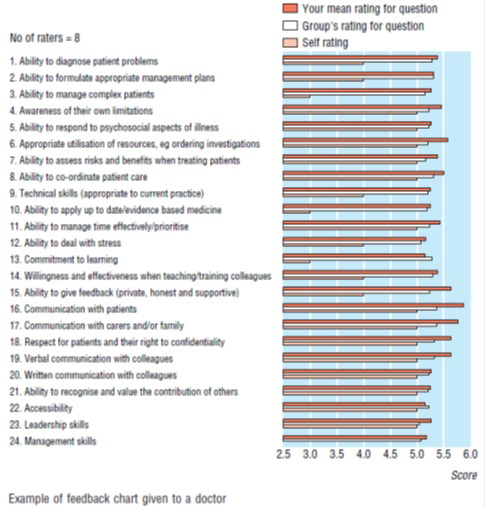【文献名】
著者名:Julian C Archer, John Norcini, Helena A Davies
文献タイトル: Use of SPRAT for peer review of paediatricians in training
雑誌名・書籍名:BMJ VOLUME 330 1251-1253
発行年:28 MAY 2005
【この文献を選んだ背景】
On July 13, I joined the meeting named MEIS(Medical Education Interactive Seminar) in Kyoto University produced by Center for Medical Education. The topic was evaluation of postgraduate trainee in UK, and Dr. Julian who is a member of NIHR(National institute for health research) and the first author of this article have explained about the comprehensive evaluation in UK pediatrician program. Among many way of evaluations, there was a multisource feedback(= 360 degree feedback) called SPRAT. In the post-conference party, I’ve had a chance to talk with Dr. Julian about his work. And he’d told me that SPRAT was formulated for GP as well and used for revalidation system. And, if needed, he can help us to study its validity in Japanese GP context.
I hit upon using this tool for assessment in our residency. So, I would like to show the article about the first study of SPRAT in UK.
【要約】
<Background and Objectives>
To determine whether a multisource feedback questionnaire, SPRAT (Sheffield peer review assessment tool), is a feasible and reliable assessment method to inform the record of in-training assessment for paediatric senior house officers and specialist registrars.
<Methods>
Trainees’ clinical performance was evaluated using SPRAT sent to clinical colleagues of their choosing. Responses were analysed to determine variables that affected ratings and their measurement characteristics.
<Results>
20 middle grades and 92 senior house officers were assessed using SPRAT to inform their record of in-training assessment; 921/1120 (82%) of their proposed raters completed a SPRAT form. As a group, specialist registrars (mean 5.22, SD 0.34) scored significantly higher (t = ? 4.765) than did senior house officers (mean 4.81, SD 0.35) (P < 0.001). The grade of the doctor accounted for 7.6% of the variation in the mean ratings. The hierarchical regression showed that only 3.4% of the variation in the means could be additionally attributed to three main factors (occupation of rater, length of working relationship, and environment in which the relationship took place) when the doctor's grade was controlled for (significant F change < 0.001). 93 (83%) of the doctors in this study would have needed only four raters to achieve a reliable score if the intent was to determine if they were satisfactory. The mean time taken to complete the questionnaire by a rater was six minutes. Just over an hour of administrative time is needed for each
doctor.
<Conclusions>
SPRAT seems to be a valid way of assessing large numbers of doctors to support quality assurance procedures for training programmes. The feedback from SPRAT can also be used to inform personal development planning and focus quality improvements.

【開催日】
2012年8月1日